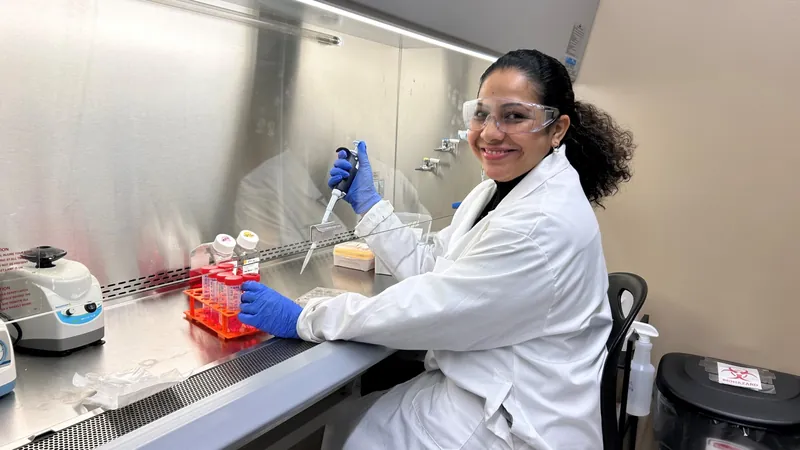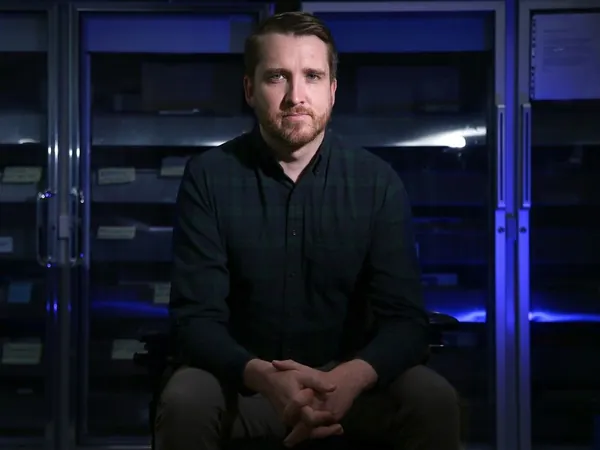
UWinnipeg Student Chathuri Mudalige Awarded for Groundbreaking Environmental Research
2025-03-25
Author: William
Introduction
In a world where approximately 350,000 chemicals are registered under the Chemical Abstract Services, alarming figures reveal that only a fraction — less than 35% — have undergone evaluation for their toxicity. Second-year Master of Environmental and Social Change (MESC) student, Chathuri Mudalige, is on a mission to address this pressing issue.
Awards and Recognition
This March, Mudalige was honored with the Deb Tardiff Scholarship from the Manitoba Environmental Industries Association (MEIA) in recognition of her outstanding academic achievements, volunteer efforts, and valuable contributions to environmental science. Expressing her gratitude, Mudalige stated, “I am sincerely grateful for this acknowledgment and remain dedicated to making a positive impact in the field. I would also like to thank my supervisor, Dr. Jean-Pierre Desforges, for his invaluable guidance throughout my journey.”
Research Focus
Conducting her research in UWinnipeg's Desforges Lab, Mudalige is focused on accelerating the testing of persistent organic pollutants (POPs) — harmful substances that pose health risks to both humans and ecosystems. Traditional methods of chemical toxicity testing have relied heavily on animal studies, a process that is not only ethically contentious but also time-consuming, often extending up to eight years before yielding comprehensive results. Mudalige highlights, "This prolonged process is the main cause of the current backlog in chemical toxicity testing."
Innovative Methodology
Revolutionizing this outdated method, her research utilizes New Approach Methodologies (NAM) to conduct in vitro studies on human cells instead. "With NAMs, we can assess a vast number of chemicals in a matter of months," she explained. This innovative technique assesses genetic changes to evaluate the safety of chemicals for human health and environmental impact, especially in fragile Arctic ecosystems.
Implications of Findings
The implications of her findings are substantial. Mudalige pointed out that understanding the health effects of various chemicals could significantly influence management strategies, fostering a shift towards animal-free toxicity testing and offering safety screenings for new chemicals prior to market release.
Funding and Support
In a promising development, Mudalige secured $19,000 from the University of Winnipeg Foundation’s (UWF) Venture Fund Group, enabling her to extend her research scope and introduce RNA sequencing into her project. "Getting the funding from the Venture Fund Group was inspiring," she remarked. "This financial support has allowed me to apply RNA sequencing, a powerful method to analyze how chemicals impact gene expression and understand their potential health and environmental risks."
Pitching for Funds
Mudalige's path to funding resembled a "Dragon's Den" style pitch, where she presented her research proposal to a panel of investors connected to UWinnipeg. Ultimately, her project was awarded the highest funding among all presenters, a boon for her research endeavors given the high costs associated with RNA sequencing.
Community Contributions
In addition to her research, Mudalige contributes to the UWinnipeg community as a lab instructor in the Chemistry Department and serves as a graduate student ambassador for the Faculty of Graduate Studies. Her accolades include several prestigious awards and grants, such as the Graduate Student Research Award and MITACS Accelerate Grant, alongside specialized training in RNA library preparation at McGill University.
Reflections and Future Opportunities
“My journey exemplifies the exceptional research support and opportunities available at UWinnipeg,” Mudalige reflects, emphasizing how her experiences have enriched her graduate studies. The next Venture Fund Group session is scheduled for Fall 2025, where students and faculty will have further opportunities to pitch innovative ideas for potential funding. Stay tuned as Mudalige’s groundbreaking work promises to pioneer a new direction in environmental research!









 Brasil (PT)
Brasil (PT)
 Canada (EN)
Canada (EN)
 Chile (ES)
Chile (ES)
 Česko (CS)
Česko (CS)
 대한민국 (KO)
대한민국 (KO)
 España (ES)
España (ES)
 France (FR)
France (FR)
 Hong Kong (EN)
Hong Kong (EN)
 Italia (IT)
Italia (IT)
 日本 (JA)
日本 (JA)
 Magyarország (HU)
Magyarország (HU)
 Norge (NO)
Norge (NO)
 Polska (PL)
Polska (PL)
 Schweiz (DE)
Schweiz (DE)
 Singapore (EN)
Singapore (EN)
 Sverige (SV)
Sverige (SV)
 Suomi (FI)
Suomi (FI)
 Türkiye (TR)
Türkiye (TR)
 الإمارات العربية المتحدة (AR)
الإمارات العربية المتحدة (AR)